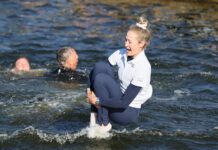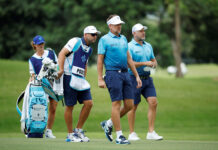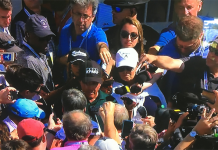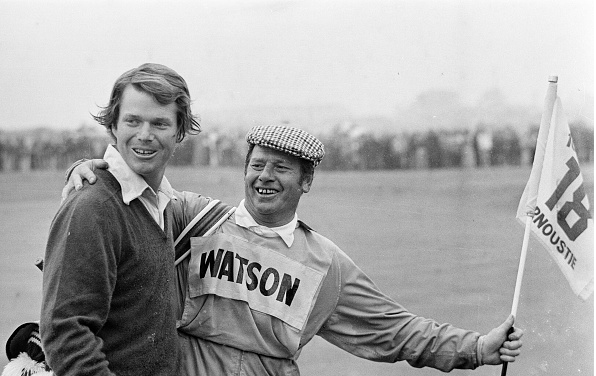
Pro Golf Weekly ranks the seven Open Championship winners who’ve raised the Claret Jug at Carnoustie Golf Links in this post titled: Ranking The Open Champions at Carnoustie.
Carnoustie Golf Links has played host to seven Open Championships, first in 1931, and most recently in 2007. From Tommy Armour’s five-shot comeback in 1931 to Jean Van de Velde’s five-shot collapse in 1999, the 176-year old Carnoustie golf course has seen it all. In honor of The Open returning to Carnoustie, here’s our ranking of its past champions.
1. TOM WATSON

YEAR: 1975, 104th Open Championship
SCORES: 71 – 67 – 69 – 72 = 279 (−9)
MONEY: $7,500
Edging Jack Newton in an 18-hole playoff, Tom Watson scored his first (of eight) major championship titles, and hoisted his first of five Claret Jugs.
After three days of calmer than usual weather, the “Open wind” kicked up during Saturday’s final round. The 54-hole leader, South African Bobby Cole, shot a 4-over 76 and missed the playoff by a shot. Watson carded an even-par 72, highlighted by a 20-foot birdie putt on the 72nd hole to join Newton (74) at 9-under par.
The Sunday playoff was contested in overcast, rainy conditions. Watson chipped in for eagle on the par-5 14th hole, but a bogey on the par-3 16th evened things up. On the 18th, Watson’s approach landed 25 feet from the pin, while Newton’s found a front bunker. After Newton sent his sand shot some 10 feet past the hole, Watson lagged his birdie putt to set up a tap-in par. Newton missed his par putt, giving Watson his maiden major.
Why the Rank: Watson won in overtime, and it was his first of five Opens. The first is always special.
2. BEN HOGAN
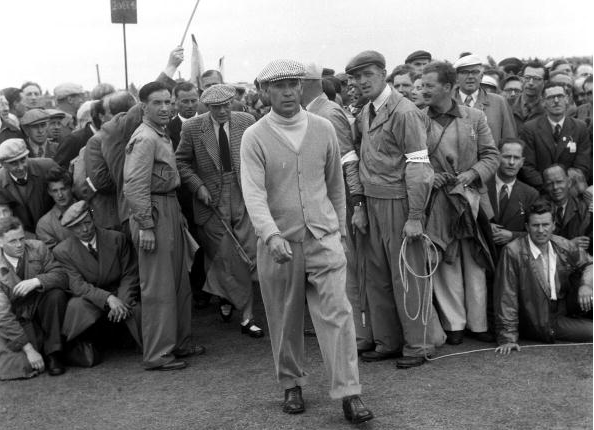
YEAR: 1953, 82nd Open Championship
SCORES: 73 – 71 – 70 – 68 = 282 (-6)
MONEY: $515
In his only Open Championship appearance, Ben Hogan claimed victory by four strokes to win his third major championship of the year.
Hogan entered the final round tied with Roberto De Vicenzo of Argentina. During the round, Hogan chipped-in for birdie at the par-4 5th, then followed with another birdie at the par-5 6th (before it was named “Hogans’ Alley”). He opened up a two-shot lead at the 13th, saved par at the 17th, then made another birdie at 18. Battling the flu, he finished with a record round of 68.
That aforementioned 6th hole features a split fairway, with the right side offering a safer play but the left offering a better angle to the green. Hogan risked his tee shot in all four rounds, and was rewarded each time with his ball safely landing in the small area of real estate now known as “Hogan’s Alley.”
Why the Rank: It was Hogan’s dropping the mic moment: He made one start, won by four shots, and never returned. And to top it off, they named a hole after him. If Watson weren’t a five-time winner, Hogan would be first.
3. GARY PLAYER
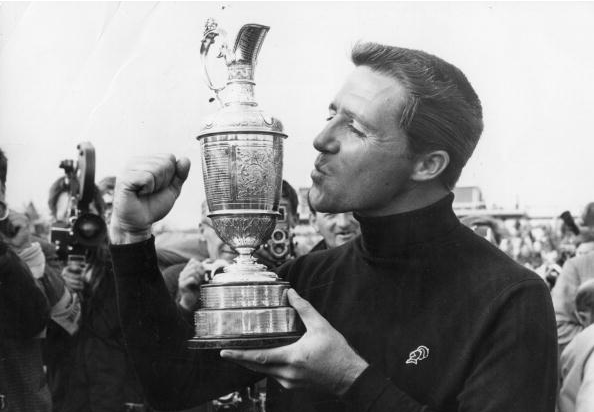
YEAR: 1968, 97th Open Championship
SCORES: 74 – 71 – 71 – 73 = 289 (+1)
MONEY: $3,000
Gary Player won the second of his three Open titles, two strokes ahead of runners-up Bob Charles and Jack Nicklaus. It was the fifth of Player’s nine major titles.
Player entered the final round in third place – down two shots to Billy Casper, and one behind Charles, but posted a final-round 73 to Caspers’ 78 and Charles’ 76 to hoist the Claret Jug.
Why the Rank: Gary Player is a grand slam winner, but how do you rank him above the greatest modern day Open champion in Watson, and Hogan’s one-start mic drop?
4. HENRY COTTON
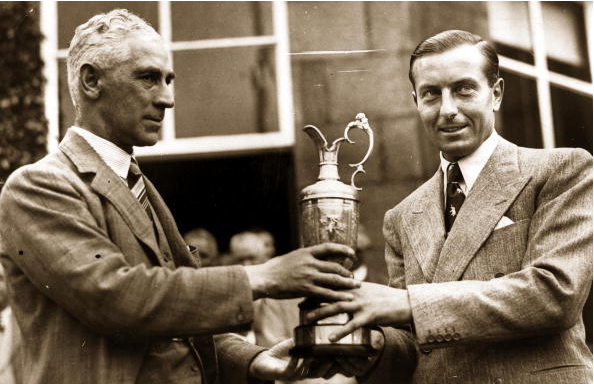
YEAR: 1937, 72nd Open Championship
SCORES: 69 – 66 – 72 – 65 = 272 (−12)
MONEY: $250,000
Henry Cotton won the second of his three Open titles, two strokes ahead of runner-up Reg Whitcombe. Cotton entered the final round down three to Whitcombe, but shot a 71 to Whitcombe’s 76 to win by two shots.
Why the Rank: With Watson, Hogan, and Player, you have three icons of golf. Henry Cotton and Tommy Armour fall into the next two slots as three time major winners. Cotton was a three-time winner of the Open, and also a pilot in WWW II, so a slight edge.
5. TOMMY ARMOUR
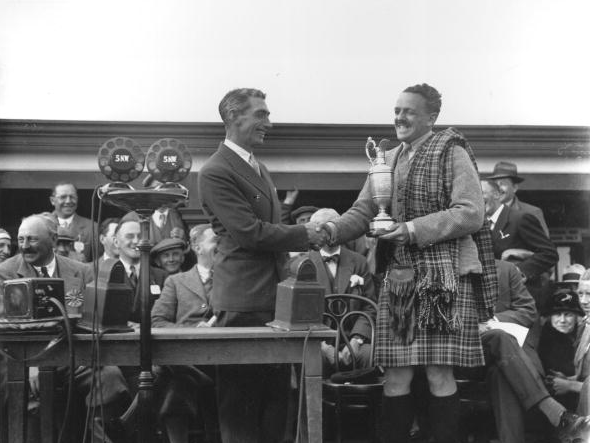
YEAR: 1931, 66th Open Championship
SCORES: 73 – 75 – 77 – 71 = 296 (+8)
MONEY: $100
In the first Open Championship contested at Carnousite, a 36-year old Tommy Armour won his first Open in 1937. It was the Scot-American’s third and final major victory.
Armour ended the third round at 9-over par and five shots back of Argentina’s José Jurado. But a final-round 71 on a day when the leaders’ scores ballooned, including Jurado (77), it was Armour who was awarded the trophy and $100 cash prize.
Armour returned to defend his title in 1932 (T17), and never returned to Britain.
Why the Rank: Armour was a three-time major winner, but captured three different majors (PGA, U.S. and British), and so for that he gets the nod over Harrington.
7. PADRAIG HARRINGTON
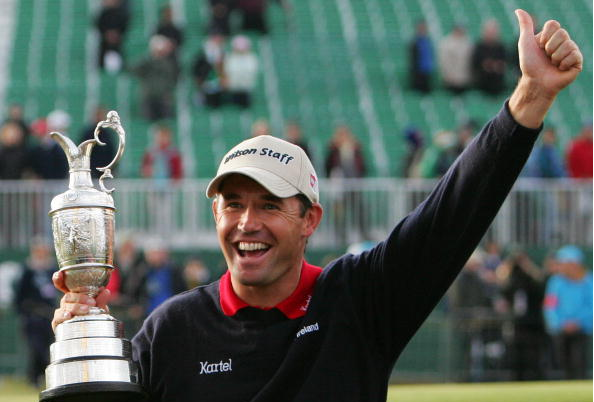
YEAR: 2007, 136th Open Championship
SCORES: 69 – 73 – 68 – 67 = 277 (−7)
MONEY: $1,542,450
Padraig Harrington defeated Sergio Garcia in a playoff to take the title and his first of three major championships in a two-season span. The Irishman entered the final round down six to Garcia, but shot a 67 to Garcia’s 73 to force a playoff at 7-under par.
Harington secured the advantage on the very first hole of overtime, carding a birdie to Garcia’s bogey. Harrington finished par-par-bogey to finish even-par 15 to Garcia’s 1-over 16.
Why the Rank: Harrington had a nice run in 2007 and 2008 but overall not a very historic player. However, he’s an upgrade over Paul Lawrie, a one-time winner.
6. PAUL LAWRIE
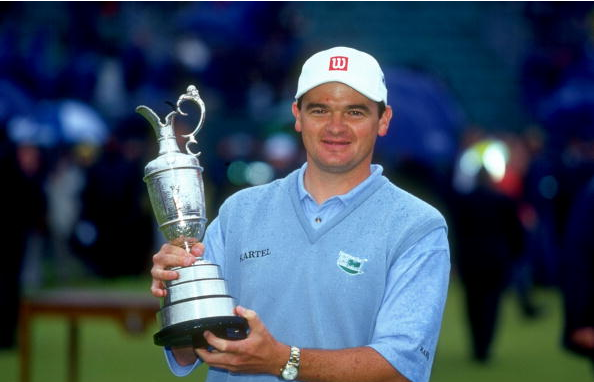
YEAR: 199, 128th Open Championship
SCORES: 73 – 74 – 76 – 67 = 290 (+6)
MONEY: $577,500
Paul Lawrie won his only major championship in a playoff over Jean van de Velde and Justin Leonard. Lawrie, down by ten strokes at the start of the fourth round, completed the biggest final round comeback in major championship history, headlined by van de Velde’s triple-bogey at the last hole.
Van de Velde held a seemingly insurmountable three-stroke lead entering the 72nd hole but made an historic mess of the par-4 18th to join Leonard and Lawrie in a four-hole playoff. Lawrie finished bogey-bogey-birdie-birdie for an even-par 15. Leonard and Van de Velde posted 3-over 18.
Van de Velde’s play on the final hole is still widely considered to be the worst “choke” in golfing history.
Why the Rank: Paul Lawrie is easily the worst of the champions at Carnoustie. A prototypical one-hit wonder, Lawrie owns just two top-10 finishes in the majors, both in the Open Championship (T6 1993, Win 1999). After his breakthrough victory, Lawrie’s next 11 Open starts included seven missed-cuts and nothing better than T42 when in the money.







